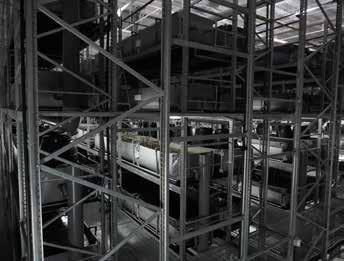
11 minute read
Live vannamei shrimp, from urban shrimp factories to global markets
New scaleup Universal Aquaculture has begun to commercialise vertical high density vannamei shrimp farming using its Hybrid Biological Recirculation System™ (HBRS), with the first harvest in 2021.
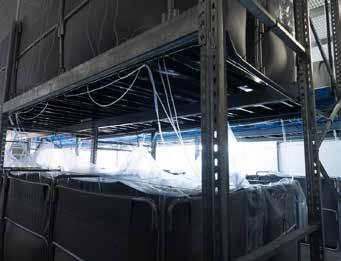
The inaugural farm is in a 1400m 2 warehouse on the sixth floor of a six- storey factory building located in Tuas on the eastern end of Singapore. Tanks are stacked 12m high.
It all started in 2019, with a prototype of a vannamei shrimp farm with four tanks appearing on the fourth floor of a warehouse in Paya Lebar in Singapore. Soon, this expanded to over 300 tanks within a farm of 14,000ft2 (1,300 m2)
Universal Aquaculture (UniAqua) officially started in April 2020 with a team of 11 members. There is an interesting story behind this team of aquaculture enthusiasts working to develop a closed aquaculture system suitable for land scarce Singapore.
Serial entrepreneur Jeremy Ong, CEO and one of the founding members, recounted their journey. “I have always been investing in sustainability and started at an early age with vegetable farming. In 2015, a college friend Clifford, who is now our CFO and a few mainly dedicated aquaculturists, wanted to do ‘something spectacular in aquaculture’. Together we wanted to have a different take on how we can do aquaculture not only in Singapore but also globally.” The mission is to build the global food systems of tomorrow, using environmentally sound and sustainable food production methods.
In urban Singapore where land is scarce, Ong reiterated that their concept was, “To build a system in the middle of the city state and serve the people within the city. We will not export or sell any of our products out of a 30km radius. This is how we started building this whole business. When we did our business modelling, we knew that we needed an indoor system where we can have total control and where we can reduce risks from inclement weather and disease pathogens. Additionally, in Singapore, where energy and labour costs are rather high, we need to be energy efficient and automate operations as much as possible.”
The prototype came into play just prior to Covid-19 but in the case of UniAqua it was just in time as in 2020, Singapore, which imports almost 16,800 tonnes annually of shrimp (live and chilled) from Malaysia, saw disruptions to imports. The Government fast tracked its program to have 30% of its nutritional needs by 2030 from 10%, with locally grown food. The ambition of UniAqua is to supply 30% of the live and chilled shrimp demand in Singapore by 2026.
UniAqua has moved fast with a 1,300m2 farm on the sixth floor of a six-storey factory building in Tuas Link, on the eastern end of Singapore. Here the target production is 150-200kg of shrimp per day, depending on size at harvest.
Ideal water conditions with a HBRS
The heart of the indoor system is the proprietary and energy saving water treatment system which took 6 years of research. This is the Hybrid Biological Recirculation System™(HBRS) where the team could adjust water parameters and create ideal conditions to match requirements of each species while save up to 80-90% of water and energy. The concept is to mimic the natural environment of the animal with water of equal quality.
“HBRS is groundbreaking using a lot of biological filtration. We do not clean the water totally, but just sufficient to meet the needs of the animals. Unlike, traditional recirculation aquaculture systems, we do not need those energy consuming systems like back wash, micro bubbles, ozone and UV etc. and yet we are able to sustain the water pH and bacteria levels at optimal levels for the shrimp. Of course, some mechanical filtration is still required.”

Jeremy Ong, CEO (centre) with team members. With a combined aquaculture experience of 100 years, it took 6 years to develop the proprietary and energy saving water treatment system, the Hybrid Biological Recirculation System (HBRSTM) which gave just the right water conditions for the vannamei shrimp.
There is also the adoption of a more holistic approach with this HBRS. “We will be adding 17,000 solar panels. By the end of 2021, we expect to be carbon neutral. It is important to stress that we designed the whole system from ground up. Our priority is to look after the animal and provide it with the best condition to grow well - even with simple factors like salinity and pH, there are certain ranges which are less stressful for the animal.” added Ong.
Indoor high density farming of vannamei shrimp
When the team built their first prototype, they tested farming several species in IBC (intermediate bulk containers) tanks - jade perch, tilapia, lobsters, seabass, freshwater prawn, crayfish and vannamei shrimp. They found that their system was versatile enough to handle the various species.
Then came the choice of which species to farm commercially at high density. “There were ‘easy to farm in closed systems’ species such as the tilapia and seabass but we chose to challenge ourselves. If we can farm Penaeus vannamei shrimp at high density, then it would be easy for any other species,” Ong added that it was also for commercial reasons since UniAqua wants to target the live shrimp market in Singapore to sustain its business.
At the Tuas Link farm, the grow-out area has 296 growout tanks, all stacked vertically in six levels reaching 12m high. It has a hatchery and nursery. It does its own broodstock maturation and breeding, and grows post larvae over 30-45 days, selecting the best for stocking into the 2.8m3 tanks for grow-out. Both hatchery and nursery are segregated from the grow-out section to minimise risk of cross contamination.
“Based on 10g shrimp, we can produce 60 tonnes/year, and with 25g shrimp, the yield will be 30-40 tonnes. In general, each tank has a 3-4kg or about 24,000 post larvae and we move shrimp along as the carrying capacity exceeds,” said Ong.
“Selection of the best performing post larvae is important for us as in Singapore, space is expensive and so are feeds,” said Ong. “Having a hatchery inhouse means that we only check for the pathogens in the broodstock. In our highly biosecure ‘factory like’ facility, we are able to keep diseases out.”
Clearly, from the onset, UniAqua cannot depend on post larvae deliveries and secondly, cannot afford any introduction of disease pathogens. As part of the biosecurity planning, there are 33 independent systems, such that when any system is compromised, they can impose a lockdown.
“Our precise advantage is that we can design the system for each customer and assure delivery of a particular shrimp size and volume on a daily basis. This is where having an inhouse hatchery is important to have full control of the production chain and ensure a consistent post larvae quality.”
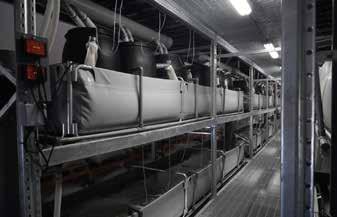
Sump tanks are all where most of the biological filtration happens before water is recirculated back to the grow-out tanks.
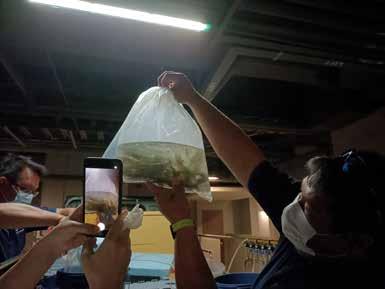
UniAqua harvests daily and sells its live and chilled Ziro Bay shrimp brand in Singapore. The promise is zero additives and zero antibiotics. Currently the demand is mainly for 12g and 22-25g shrimp.
Marketing Ziro Bay in Singapore
UniAqua harvests daily and sells its live and chilled fresh Ziro Bay shrimp brand in Singapore. The promise is zero additives and zero antibiotics.
“Amid this Covid-19 pandemic, we solve the supply problem as retailers and restaurants usually depend on imports. We assure consistency in supply which restaurants need. Although using land-based systems is usually not a cheap production method, we have managed to produce at a very competitive cost. We have received accolades from chefs privately and some have complimented our shrimp as sweet,” said Ong.

AquaOS
In a farm like UniAqua, automation is a necessity, and the team members believe that they need to think out of the box on operating and monitoring systems. They have AquaOS, equating to a ‘digital farmer’ automatically controlling feeding and water quality management. Plans on big data analyses in the near future will cover monitoring of broodstock mating, health sorting at the nursery level, regulating transfer from nursery to grow-out and managing sludge.
UniAqua has to improve on predictive farming and continue to collect data and optimise AquaOS. A big challenge is auto feeding 296 tanks and as it expands to up to 3,000 tanks, the challenge grows. “Imagine a system to cater for feeding shrimp in this number of tanks 8-12 times per day. There are no suitable models in the market, so we had to reinvent the wheel. We needed cutting edge technology - a robust yet simple feeding system which can deliver feed at an accuracy of 1g. We believe that visual checks are more accurate than acoustics. We are now testing a prototype.”
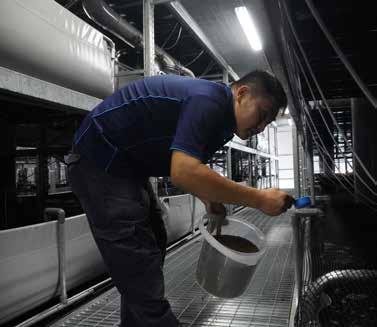
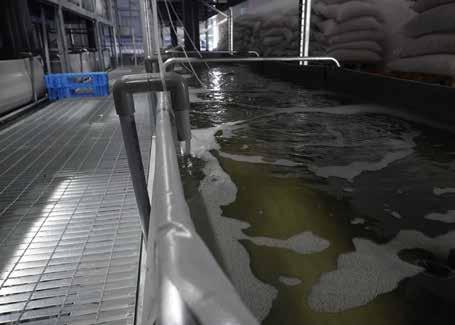
Next phase of growth
With regards to feeds, there is the need for an ideal feed for this zero water exchange HBRS and in situations such as during this pandemic, where food security is important, the farm wants to ensure a year’s feed supply to continuously produce shrimp. At the same time, the team has been busy measuring digestibility and waste output of around 30 feed types, both extruded and pelleted; these were made easier in the grow-out tanks with zero water exchange. Interestingly, the team saw through changes in water quality parameters, the vast range of protein quality in the feeds.
In the next phase of its growth, UniAqua expects to have 2,000 to 3,000 tanks in a new farm and scale up 7-fold to an annual production of 1 tonne per day. By 2024, it expects to reach revenues of more than SGD525 million (USD374 million).
Meanwhile, in 2022, Ong will be leading the team to expand globally. “Because our system is portable, we can easily transfer it any where in the world. We will export our farm technology but will not export shrimp. This means that in any place, the market will be local, thus ensuring a low carbon footprint.”
Finally, Ong said, “We are farmers and understand the situation in shrimp farming. We are not a technology company. We want to use our farming technology to help farmers elsewhere. So you have a warehouse empty and would like to start shrimp farming and market live shrimp, I will be happy to discuss with you.”
A collaboration to develop world’s first functional performance shrimp feed for HBRS™
In September, Universal Aquaculture (UniAqua) and Grobest Group jointly announced a partnership to collaborate on the development of the world’s first next-generation functional performance shrimp feed for UniAqua’s proprietary Hybrid Biological Recirculating System™. In initial trials, Grobest functional performance feeds have outperformed competitive products by yielding healthier, tastier shrimp and significantly better water quality.
The cooperation between the two companies comes at a time when Singapore is pursuing the goal of 30% home-grown food by year 2030. The roughly 730 km2 city-state heavily relies on imported food due to its relatively small land available for food production, which effectively reaffirms the importance of intensified production to satisfy the food demand of its growing population.
In UniAqua’s six-tier system, shrimp are farmed in stacked units with juveniles at the top level and grow-out tanks the bottom waiting to be harvested and shipped to the market. The combination of recirculation, biofloc and mechanical filtration ensures that the farming environment remains stable and secure while minimizing energy consumption.
“With a vertical indoor system of such high density, every parameter’s impact is magnified.”, said UniAqua CEO Jeremy Ong, “Hence, we designed the systems to be especially modular and systematic with the intention to incorporate IoT and machine learning within our operating system to ensure scalable efficiency. A major component would be the feed that we put in the tanks - how soluble they are, how receptive our shrimps are to them, the residue left and other aspects like taste profile. We are really excited to see how this partnership with Grobest will help to bring us closer to the optimal feed.”
This intensive aquaculture system requires safe, antibiotic-free and highly palatable aquafeed with the least possible leaching to further streamline the process and remain at the apex of innovation. Grobest will work closely with UniAqua to develop next-generation feed that is tailored for this model to facilitate all its technological advances.
In announcing the partnership, Grobest Group CEO, Samson Li, stated “We are looking forward to working closely with the UniAqua team to develop the world’s first Functional Performance Shrimp Feed specifically formulated for RAS systems. Grobest has always led innovation in the aqua feed industry since the introduction of our proprietary bio-tech Functional Performance Feeds over 15 years ago. Making our farmers more successful, more productive and more profitable across all farming models is the essence of ‘The Grobest Difference’ and is why this partnership with Universal Aquaculture is an exciting next step that reaffirms our commitment to leading the industry by partnering with other leading innovators. The development and expansion of new farming models, such as UniAqua’s proprietary Hybrid Biological Recirculation System™ will be critical in the development of the industry over the next decade and it brings a unique set of challenges that urgently need a solution.”










